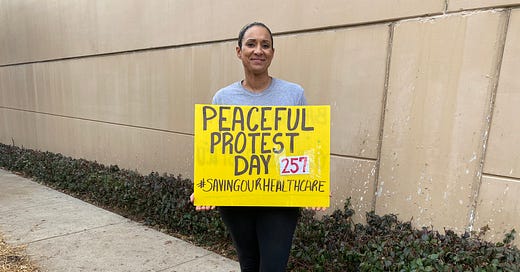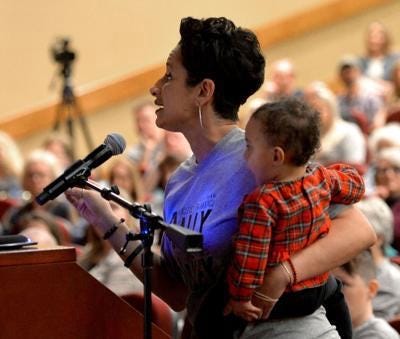"Country. Not Stupid. That’s what people get wrong about rural voters."
Appalachian organizer Dani Cook on her fight for better health care and against monopolies in her home country of Northeast Tennessee and Southwest Virginia.
Dani Cook is a Certified Life Coach, spoken word artist, and organizer in Northeast Tennessee and Southwest Virginia. Cook led a months-long peaceful protest for better health care in her region over problems at the “state-sanctioned medical monopoly,” Ballad Health. For more on Cook’s health care work, read Scalawag’s “Profit over people: Inside an Appalachian struggle to save rural healthcare,” and Rally for the Valley on Facebook.
The Cocklebur conducted this interview with Cook over email as part of our “Meet a Rural Organizer” series. Meet a Rural Organizer runs each Friday in The Cocklebur, and features rural activists, advocates, and leaders who fight for the places they love.
The interview has been lightly edited for length and clarity.
The Cocklebur: So, tell me something good about rural organizing in your part of the world.
Dani Cook: The good thing about organizing in northeast Tennessee and Southwest Virginia is that I’m from here so I know what it’s like. It’s also good because word spreads fast. If you make a compelling case with someone on issues and it alters or even shifts their original perspective, they share it with the people around them. The other thing that is good about organizing here is that things have progressed over the years. More people are open to ideas and beliefs that don’t necessarily align with the way they’ve been taught all their lives.
The Cocklebur: What are the issues driving the talk at the schools and gas stations and nursing homes and such in your area?
Dani Cook: My answers to this question are going to be a little biased because of the organizing work I’ve done here. Most people know me because of the peaceful protest I led against the state-created medical monopoly, Ballad Health, and the Departments of Health in Virginia and Tennessee. Because of that and because healthcare is one of the main issues people care about, the talk I hear most about is related to hospitals, nursing homes, and the quality of care or lack thereof, that people are receiving.
The second issue I hear a lot about, especially as it relates to schools, is about systemic racism still prevalent that BIPOC students are experiencing. Growing up in the region as a biracial child being raised by a white woman in the early 70s was definitely a challenging experience. I have shared many of those things with the public via my broadcasts and podcast episodes. So again, people are drawn to me because they can relate to me and they know that I will listen, empathize, and understand their position.
The Cocklebur: Let's say you're door knocking or phone banking or tabling with rural people. Issue organizing. Election Work. Tell me something you've learned.
Dani Cook: The number one thing I’ve learned is to be authentic and stay on the issue. For example, when I was focused on Ballad Health, especially when posted outside of Holston Valley Medical Center 24/7 for 257 days straight, I didn’t cover a lot of the racial and social justice issues that I knew would be divisive. We had a shared interest: healthcare - so, that’s what I stuck to 95% of the time. It’s why so many people joined us in that effort. We collected about 30,000 local paper signatures and 14-15 of us carried them to Washington D.C. in June 2019. We met with Marsha Blackburn, Mark Green, Phil Roe, Lamar Alexander’s office, Tim Kaine’s office and more. We gave each of them a copy of those signatures asking them to take action on behalf of the people.
If I had spent time trying to convince people about LGBTQIA rights, women’s rights, or racial/social justice issues, I don’t believe we would have been as impactful. Now, that’s not to say I never talked about those things. I did. But usually, that happened with our core group of protestors who had developed a level of relationship that allowed space for those types of discussions.
The Cocklebur: And now you get to tell everybody your take on the things that political pundits and consultants get wrong about rural voters.
Dani Cook: I have a shirt that I designed during the healthcare protest. It says: Country. Not Stupid.
That’s what people get wrong about rural voters. They aren’t dumb or stupid. They aren’t intentionally voting against their own interests. Many of them were born and raised in their communities and feel strongly in their beliefs. But as strong as those feelings are, when you make good sense on the issues and have “earned the right” to share and ask tough questions, they are willing to listen and will even shift their position.
The other thing people get wrong about rural voters is that they are all country, small-minded right-wingers. There are many progressive people living in rural communities. They just haven’t had a space and the support to be seen and make the needed changes.
The Cocklebur: You're a rural organizer and you need money. Tell everybody how much you need to get the job done, and then say what you'd do with that funding. I mean, instead of buying TV ads in the suburbs.
Dani Cook (Note--this is a pitch Cook would give for a hypothetical state-level House or Senate campaign): Alright folks, we need $50,000 to competitively run this race, win the election, and make your voices and issues heard in Nashville. Why $50K? Because the incumbents have the advantage and they have the backing of the “old money” that’s been putting them in office for the last 30 years. We need that money in order to drive to every county in this district, host town halls, have community forums, knock on doors, and sit on your front porches talking about the things that matter to you and your family. As you know, gas costs money. So do good people. And we need good people to write emails, make phone calls, and knock doors. While I love and will take volunteers, I would rather pay people a decent wage for their time and effort. We need you to make that happen. I need you to make that happen so I can make legislation in Nashville happen that benefits you.
The Cocklebur: Any local leaders or up-and-comers doing rural work you'd like to highlight?
Dani Cook: I’m just coming back to the area after taking a break to work the Stacey Abrams campaign so I’m not sure who’s heavily on the scene here. I have known Aftyn Behn since I met her in 2019 during the healthcare protest. I’ve always admired her heart and her willingness to use her privilege for others.
The Cocklebur: Now you get to recommend a book, a song, and a something to watch on a screen.
Dani Cook:
2.) Another Book: Daring Greatly by Brene Brown
3.) Song: “My Power” by Chika
4.) Something to Watch: 13th (Netflix Documentary)
The Cocklebur: Closing statement. Brag about your organization, yourself, and your work.
Dani Cook: If I could leave you with one thought, it would be this: Hold onto hope.
I am currently working on a project for Ruralorganizing.org conducting dozens of interviews with rural organizers across the country and this is the one word that keeps coming up: HOPE. This is the emotion that we must tap into when speaking to each other and with prospective voters. Policy and issues simply aren’t enough.
I have this saying that I learned many years ago: “People don’t care how much you know until they know how much you care.”
Remember that and keep it front and center while doing this work. If your heart is tired, take a minute to rest and regroup, then come back to it. The people will feel it when you mean it - and that’s what will make all the difference.
END OF INTERVIEW WITH DANI COOK.
If you’re in the mood for some audio, The Cocklebur got podcasted this week by Heritage Radio Network’s “What Doesn’t Kill You.” Katy Keiffer is the host, and I thoroughly enjoy hanging out with her. The photo is a little out-dated, as my beard and hair are a bit longer and greyer these days, but that’s okay. I invite you to take a listen if you have the time, and subscribe to Katy’s pod:
The Cocklebur covers rural policy and politics from a progressive point-of-view. Our work focuses on a tangled rural political reality of dishonest debate, economic and racial disparities, corporate power over our democracy, and disinformation peddled by conservative media outlets. We aim to use facts, data, and science to inform our point-of-view. We wear our complicated love/WTF relationship with rural America on our sleeve.






